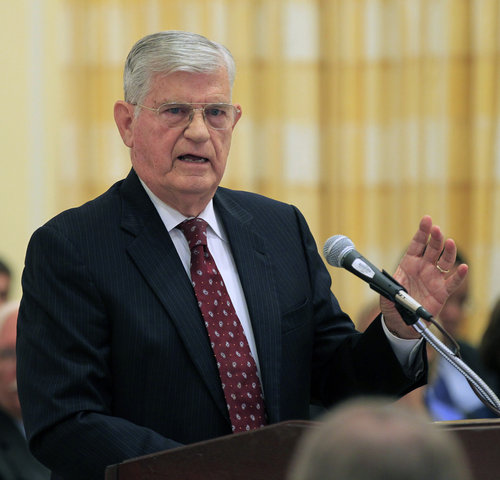Martin Report About UNC Academics Released: Leaves Questions Unanswered
Posted by mpatton on December 20th, 2012North Carolina released the independent report from former governor James Martin Thursday morning and a lot people aren’t happy. Admittedly biased rival fans aren’t satisfied (or here), and North Carolina fans and alumni aren’t either. The primary reason for people’s disdain is simple: The report doesn’t add much, in substance, to what was already known. Yes, Martin throws out some statistics about the number of grade changes investigated, but the major players weren’t interviewed. That means Julius Nyang’oro (the head of the African American Studies department, who taught many of the fraudulent classes), Debbie Crowder (Nyang’oro’s assistant) and Wayne Walden (the counselor who came to North Carolina with Roy Williams but left in 2009 when basketball players stopped taking African American Studies classes) were not interviewed.

Jim Martin released his report on the UNC academic scandal, which left most questions unanswered. (Photo: Chris Seward / Raleigh News & Observer)
The report puts the onus of the scandal on the African and African American Studies department with Nyang’oro taking all the blame, but the lack of relevant interviews leads to a murky picture (emphasis added):
We were unable to discern a clear motive for establishing and offering these perverse and anomalous courses. The evidence is consistent with one hypothesis that these courses were provided for the primary purpose of enlarging the department’s enrollment, as a factor for increasing its allotted faculty positions. As a generality, no one was paid extra for having more than the normal number of these courses. There is no evidence that anyone outside of the Department office was active in its instigation and continuance. I believe personally that the big money from television contracts does distort values of collegiate sports programs; but we found no evidence that it was a factor in these anomalous courses. Despite what one might imagine, there is no evidence the Counselors, or the students, or the coaches had anything to do with perpetrating this abuse of the AFRI/AFAM curriculum, or any other.
So essentially after the Martin Report, we’re no closer to finding out why these classes existed. Were they for athletes? To increase enrollment? Because Nyang’oro loved reading 20-page research papers instead of lecturing? The paragraph above admits that the money in college athletics “does distort values” of programs, but in the same paragraph accepts absence of evidence (from what appears to be a corporeal investigation) as evidence of absence.
Additionally, the report (and scandal) is unfair to the many African and African American Studies majors from North Carolina over the past 15 years who worked for their degree. Hopefully people will realize the relative enrollment in the fraudulent classes was incredibly low compared to the enrollment in the department. Also, there’s been no evidence that students knew the classes were fraudulent (which is the reason athletes and the academic support staff weren’t implicated). Now, the report’s lack of depth doesn’t mean that the basketball team should’ve been implicated or that at its heart this was an athletic scandal. But the Martin Report did nothing to elucidate the extent of the scandal and athletics’ relationship to it. Instead it confirmed and fleshed out what we already knew. Ousted football coach Butch Davis also took some shots at the Tar Heels in light of the report: “Gov. Martin expressly found that this was ‘not an athletic scandal as originally speculated,’ and no coach had ‘anything to do’ with it. He further found that these practices were set in place a decade before Butch Davis arrived in Chapel Hill.”
——————————————————————–
Related Aside:
As a science major, I thoroughly enjoyed Martin’s pot-shot at grade inflation in Humanities (Martin was a chemistry major). Did it belong in the report? I’m not sure, but there’s nothing like calling out Humanities for not “maintaining their integrity” because of high average GPA. The rant is:
I will close by sharing with you my astonishment at the growing trend among faculty at most institutions in America to award high grades to all but a few students. Back in the day, when I was teaching undergraduates, it was normal that the national average of all grades was approximately C+ (a 2.5 GPA). For some reason, this has steadily risen to 3.3 GPA, even higher if you take out mathematics and the physical sciences, which still maintain their integrity with averages of 2.5 GPA.
It is as if the instructors are unwilling or unable to distinguish between good performance and great performance, or maybe want to help weaker students get admitted to graduate and professional schools. In my opinion, this is part of the cultural malaise in higher education that looked the other way when one or two launched the pattern of anomalous courses here that we have examined. The mutual mantra (The Inverse Golden Rule of Academia) is: I won’t question how you teach and grade your courses, if you won’t question mine.
Boom. Roasted.









































